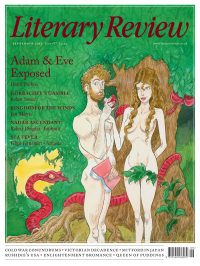Tom Williams
Whose Line Is It Anyway?
Reconciliation
By Guy Ware
Salt Publishing 300pp £8.99
Reconciliation opens with an intriguing apology by the author ‘for the extent to which my characters fail to resemble their real-life models’. This indicates a central concern of Guy Ware’s novel: namely, how the fiction writer appropriates ‘facts’ to create a story. It’s a preoccupation that informs the book’s highly original narrative structure.
The first part of Reconciliation gives a taste of the sorts of slippages in time and mode with which the reader must contend. The book opens in February 2003, when Martin, the narrator, is in a testy relationship with Holly, an archivist working in Cambridge. The tensions between them worsen

Sign Up to our newsletter
Receive free articles, highlights from the archive, news, details of prizes, and much more.@Lit_Review
Follow Literary Review on Twitter
Twitter Feed
It wasn’t until 1825 that Pepys’s diary became available for the first time. How it was eventually decrypted and published is a story of subterfuge and duplicity.
Kate Loveman tells the tale.
Kate Loveman - Publishing Pepys
Kate Loveman: Publishing Pepys
literaryreview.co.uk
Arthur Christopher Benson was a pillar of the Edwardian establishment. He was supremely well connected. As his newly published diaries reveal, he was also riotously indiscreet.
Piers Brendon compares Benson’s journals to others from the 20th century.
Piers Brendon - Land of Dopes & Tories
Piers Brendon: Land of Dopes & Tories - The Benson Diaries: Selections from the Diary of Arthur Christopher Benson by Eamon Duffy & Ronald Hyam (edd)
literaryreview.co.uk
Of the siblings Gwen and Augustus John, it is Augustus who has commanded most attention from collectors and connoisseurs.
Was he really the finer artist, asks Tanya Harrod, or is it time Gwen emerged from her brother’s shadow?
Tanya Harrod - Cut from the Same Canvas
Tanya Harrod: Cut from the Same Canvas - Artists, Siblings, Visionaries: The Lives and Loves of Gwen and Augustus John by Judith Mackrell
literaryreview.co.uk